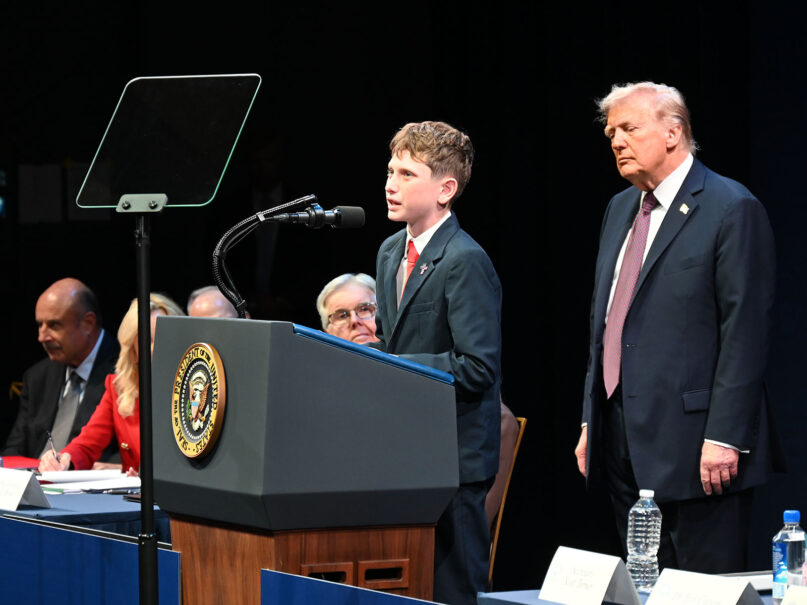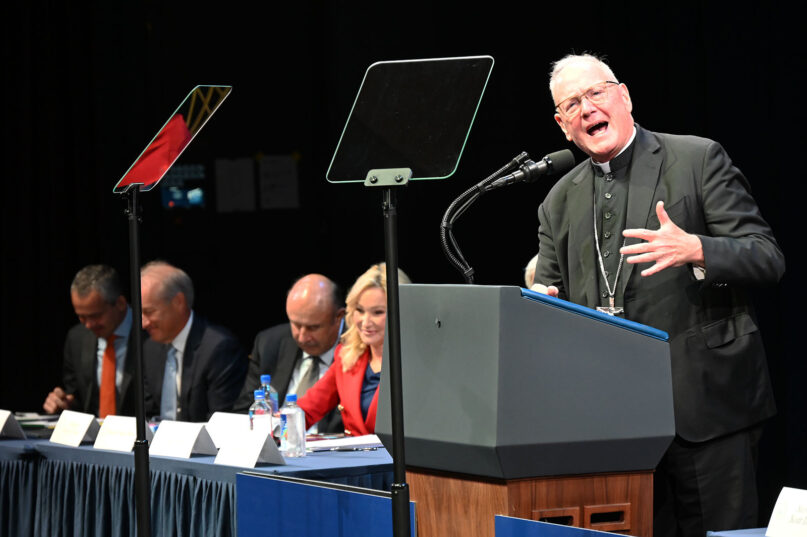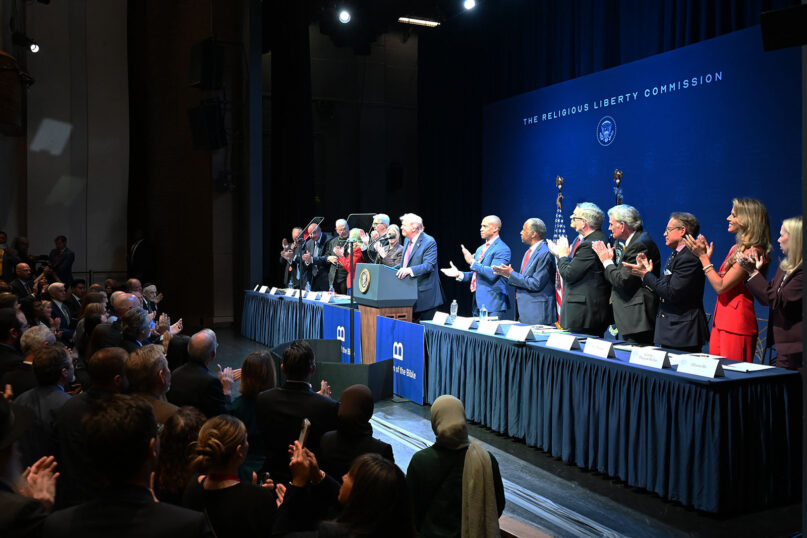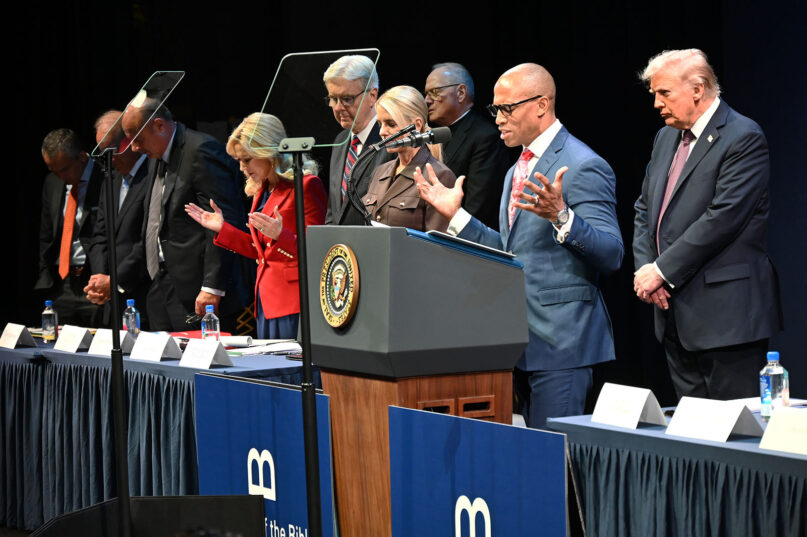WASHINGTON (RNS) — In a speech on religious liberty given at the Museum of the Bible on Monday (Sept. 8), President Donald Trump vowed his administration would combat “anti-Christian bias,” spurring cheers from the crowd at an event that was almost entirely focused on Christianity.
“There is a tremendous anti-Christian bias,” said Trump at a public hearing of the White House Religious Liberty Commission, created by executive order in May. “We don’t hear about it. You hear about antisemitic, but you don’t hear about anti-Christian. They have a strong anti-Christian bias, but we’re ending that rapidly, I will tell you — we’re in a much different world today than we were one year ago.”
The crowd, which included members of several faiths, but where conservative Christians were heavily represented, roared its approval.
The Religious Liberty Commission operates under the auspices of the U.S. Department of Justice. The agency’s head, Attorney General Pam Bondi, introduced Trump at the event, saying there is “no greater defender of the First Amendment than the president.”
In the nearly 50-minute speech that followed, the president addressed his decision to deploy National Guard troops in U.S. cities and meandered through unrelated topics. But he repeatedly returned to the topic of the day: what he said is widespread discrimination faced by religious children, particularly conservative Christians, in public schools.
“We will protect the Judeo-Christian principles, and we will protect them with vigor,” said Trump, who also created a separate anti-Christian bias task force in February. Later in his remarks, he announced that the Department of Education will “soon issue new guidance protecting the right to prayer in our nation.”

Shea Encinas, 12, of Encinitas, Calif., addresses a White House Religious Liberty Commission event at the Museum of the Bible, Monday, Sept. 8, 2025, in Washington. (RNS photo/Jack Jenkins)
Since Trump was inaugurated, his administration has been sued by at least 55 faith groups, including 15 Christian and Jewish denominations and 18 regional denominational bodies. Four of those lawsuits focus on the administration’s decision to end a policy that discouraged immigration raids at houses of worship and accuse the administration of infringing on the plaintiffs’ religious freedom.
One of the groups suing the administration is the U.S. Conference of Catholic Bishops, whose members include two prelates who serve on the Religious Liberty Commission: Bishop Robert Barron of Winona-Rochester, and Cardinal Timothy Dolan of New York, who opened Monday’s hearing with a prayer.
“We renew our rock-solid conviction that we are one nation under God,” Dolan said. “We daily — we daily — renew our trust, our belief that: ‘In God we trust.’”
At one point in his speech, Trump ceded the lectern to a student, Shea Encinas, who described how, in fifth grade, he was compelled by his school to read a book to another student “about changing his gender.” The book, Encinas said, conflicted with his religious beliefs.
Several other students recounted stories of what were framed as examples of anti-Christian bias. One student claimed she was asked to remove a “Jesus Loves Me” mask by officials at a school in Mississippi, and another voiced frustration with efforts to censor a religious song she planned to sing in school.

Cardinal Timothy Dolan speaks at a White House Religious Liberty Commission event at the Museum of the Bible, Monday, Sept. 8, 2025, in Washington. (RNS photo/Jack Jenkins)
Both students said they were aided by outside groups such as the Alliance Defending Freedom and First Liberty Institute, conservative Christian legal organizations that have representatives who either serve on the commission or advise it.
The commission has an upcoming hearing on antisemitism, but all of the witnesses at Monday’s morning session were Christian, and the event had a decidedly conservative Christian lean. One commission member, the Rev. Franklin Graham, on being asked to introduce himself, recounted Christian beliefs in Jesus’ crucifixion and resurrection in his short statement. Housing and Urban Development Secretary Scott Turner announced a religious celebration of the United States’ 250th anniversary next year, ending with a prayer that appealed to the broader religious community but closed “in Jesus’ name.”
Ismail Royer of the Religious Freedom Institute, a Muslim who advises the religious freedom panel, said he was unconcerned with the focus on Christianity, primarily because he did not see it as “denigrating of the rights of people who are not Christians.”
But Sameerah Munshi, another Muslim on the commission’s advisory board, said in an interview with Religion News Service that she was “obviously” concerned about the Christian-centric event. “Religious freedom is for every single person of religion — or not of religion — in the United States,” she said.

Attendees applaud President Donald Trump, center, at a hearing of the White House Religious Liberty Commission at the Museum of the Bible, Monday, Sept. 8, 2025, in Washington. (RNS photo/Jack Jenkins)
Munshi gave testimony at the hearing on Mahmoud v. Taylor, a case decided earlier this year by the U.S. Supreme Court giving parents the right to have their children opt out of being taught subjects that might violate their religious beliefs. The case was brought by residents of Montgomery County, Maryland, where Muslim parents, among others, were concerned about a curriculum that included books about LGBTQ+ inclusion.
“The Muslim community holds a wide range of views, and while these are conversations that are currently ongoing in our community, what is important is to accommodate American Muslims and other practitioners of religion within the law, regardless of their political affiliation or diversity of views, especially when they believe their religion to directly influence their views,” Munshi said.
Near the end of her remarks, Munshi began discussing support for Palestinians in Gaza, a cause she said is a religious one for many Muslims. She listed instances of what she said were students whose pro-Palestinian speech had been censored.
“Whether a student says, ‘I believe there are only two genders,’ or ‘I believe Palestinians are undergoing a genocide,’ they should not be silenced or punished for expressing their beliefs,” she said. “If religious freedom is to have any meaning at all, it must provide people of faith the freedom to express their convictions.”
She added that pro-Palestinian speech, “opposition to genocide” and other issues are “intrinsically religious issues for Muslims, not merely secular ones.”

Housing and Urban Development Secretary Scott Turner leads a prayer during a White House Religious Liberty Commission event with President Donald Trump at the Museum of the Bible, Monday, Sept. 8, 2025, in Washington. (RNS photo/Jack Jenkins)







